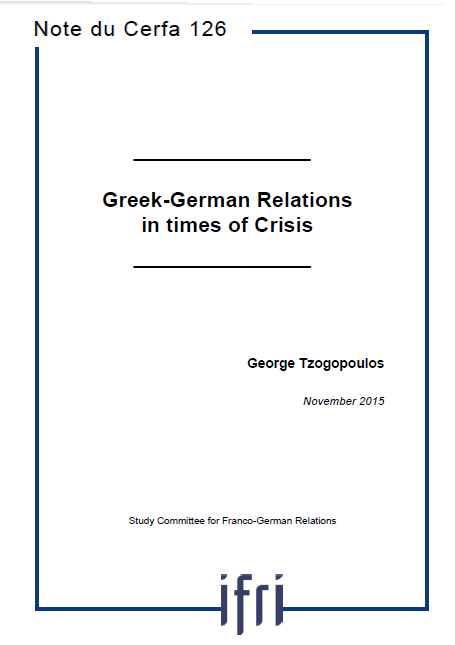Greek-German Relations in Times of Crisis

This essay focuses on Greek-German relations with emphasis on the period of the SY.RIZ.A-Independent Greeks governments in 2015. In particular, it attempts to outline the political dimension of negotiations between Athens and Berlin at the EU level and explore mistakes and opportunities in the bilateral relationship.
The essay starts with a brief analysis of the scapegoating tactics employed by Greek and German politicians from the outbreak of the Greek crisis in October 2009 until the Greek twin elections of 2012 which fueled a negative climate in the media and public discourse. It also deals with the period of rapprochement following the formation of the New Democracy – PA.SO.K and Democratic Left government in June 2012 and explains the reasons the credibility deficit was then relatively restored.
Having already presented the anti-German pre-election rhetoric of the SY.RI.ZA party, the essay then covers the dramatic discussions leading to the Agreekment of 12 July 2015 during which the new Greek government failed to change the German and European approaches of the crisis and landed into reality in an anomalous way. In this part, it pays attention to the role of Finance Ministers Varoufakis and Schäuble, the impact of the Greek referendum on the personal relationship between Premier Tsipras and Chancellor Merkel and potential obstacles that might cause new bilateral disagreements in the future, especially regarding the sustainability of the Greek debt. Finally, the essay brings the significant challenge of migration to the agenda of Greek-German relations and considers this issue a good opportunity for Athens and Berlin to co-operate in a constructive way in the coming years and overcome previous misunderstandings.
This content is also available in French: Les relations gréco-allemandes en temps de crise
Dr George Tzogopoulos is Research Fellow at the Hellenic Foundation for European and Foreign Policy (ELIAMEP) and the Centre International de Formation Européenne (CIFE) and a visiting Lecturer at the European Institute in Nice. He is also the founder of chinaandgreece.com and a columnist in Global Times (China). George is the author of the books “US Foreign Policy in the European Media: Framing the Rise and Fall of Neoconservatism” (IB TAURIS) and ”The Greek Crisis in the Media” (Ashgate).
Download the full analysis
This page contains only a summary of our work. If you would like to have access to all the information from our research on the subject, you can download the full version in PDF format.
Greek-German Relations in Times of Crisis
Related centers and programs
Discover our other research centers and programsFind out more
Discover all our analysesMerz’ European Policy-making: The End of the ‘German Vote’?
Friedrich Merz’s European ambition is to turn Germany, long seen as hesitant into a leading actor within the European Union (EU). To that end, he has pledged to end the “German vote,” a phenomenon that epitomizes the paradox of a country both indispensable and frequently absent from European decision-making.

Securing critical raw material (CRM) value chains – a prerequisite for Europe’s technological resilience
At the heart of economic security, technological resilience is a backbone of the European Union’s (EU) competitiveness. The EU’s energy and digital transitions depend on critical raw materials (CRM).

Reconciling competitiveness and demographic change: a Franco-German imperative
France and Germany are facing parallel demographic shifts that could reshape the future of their economies and their social models. These shifts reflect broader European patterns but are magnified by the central role both nations play in EU governance and competitiveness.
Taking the Pulse: Does France's Political Crisis Weaken Europe's Geopolitical Hand?
While the EU tries to navigate a myriad international challenges, France is experiencing historic political disarray. What impact will instability in Paris have on Europe's geostrategic capacity?









